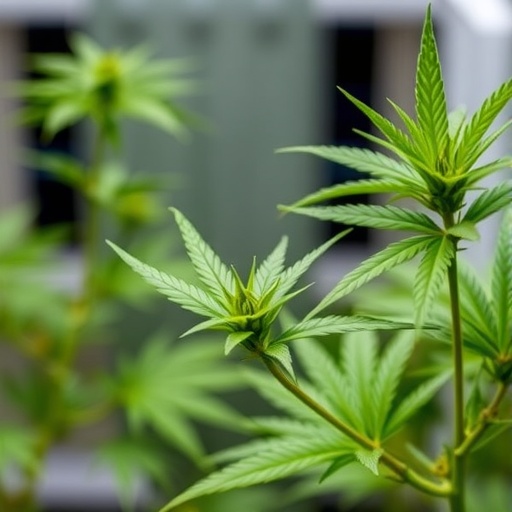The integration of medical cannabis into mainstream healthcare is undergoing a transformative phase, reflecting a significant shift in global medical paradigms. Despite its burgeoning acceptance and utilization across numerous countries, a considerable gap remains in the preparedness of healthcare professionals to effectively incorporate cannabis-based therapies into their clinical practice. This gap underscores the urgent need for structured education and the development of core competencies concerning medical cannabis, to empower physicians with the knowledge and skills necessary for responsible patient counselling and treatment recommendations.
A recent landmark publication in the Journal of the American Medical Association (JAMA) Network Open presents a meticulously crafted consensus statement entitled “Developing Medical Cannabis Competencies: A Consensus Statement.” This document emerges from a collaborative effort involving experts from leading United States institutions and the Regional Alcohol and Drug Abuse Research (RADAR) Center at Ben-Gurion University of the Negev in Israel. The statement delineates the foundational competencies required by healthcare providers and trainees to integrate medical cannabis judiciously, bridging the existing educational deficiencies within clinical curricula.
The RADAR Center has established itself as a pioneering force in medical cannabis research and education over the past several decades. Its longstanding collaboration with prominent U.S. agencies such as the National Institute on Drug Abuse (NIDA) and the Substance Abuse and Mental Health Services Administration (SAMHSA) has facilitated a robust research infrastructure and policy dialogue around cannabis as a therapeutic option. This synergy between academia and federal institutions underscores the evolving recognition of cannabis not solely as a recreational substance but as a legitimate component of therapeutic regimens for a variety of conditions.
Central to the consensus development process was a comprehensive multinational survey conducted by the RADAR Center, funded by generous donations from benefactors including the late Dr. Mort and Dr. Toby Mower. Initiated in 2018, this expansive study canvassed healthcare professionals’ attitudes, beliefs, and competencies regarding medical cannabis across diverse healthcare environments. Importantly, the research focused on eighteen medical indications recognized for cannabis use, including chronic pain syndromes, chemotherapy-induced nausea, sleep disorders, inflammatory bowel diseases, as well as neurodegenerative illnesses such as Alzheimer’s and Parkinson’s disease. The results illuminated significant disparities in practitioner confidence and knowledge, highlighting an imperative for standardized educational frameworks.
This consensus statement integrates clinical pharmacology, patient safety, regulatory considerations, and ethical prescribing principles specific to medical cannabis. It addresses the complexities of cannabinoid pharmacodynamics and pharmacokinetics, emphasizing the need for clinicians to understand variable bioavailability associated with different administration routes. Moreover, it stresses the importance of recognizing potential drug interactions and contraindications, particularly in polypharmacy scenarios common among patients with chronic illnesses. Through such detailed technical guidance, the statement aims to enhance clinical decision-making, ensuring therapeutic efficacy while minimizing adverse outcomes.
The burgeoning body of research attributed to the collaboration across various US universities, including Albert Einstein College of Medicine, the University of California San Francisco, University of Chicago, and others, amplifies the scientific rigor underpinning the consensus. Their involvement reflects a multidisciplinary approach combining expertise in addiction medicine, pharmacology, psychiatry, and primary care. This framework facilitates a holistic perspective on the role of medical cannabis, acknowledging both its therapeutic potential and the challenges posed by its regulatory classification and sociocultural perceptions.
An additional dimension of significance in this international collaboration is its role in advancing scientific diplomacy. The RADAR Center’s work exemplifies how cross-border academic partnerships can foster global advancements in mental health and substance use prevention. By aligning multinational educational standards and research methodologies, the initiative is setting precedence for harmonized healthcare practices concerning emerging therapies such as medical cannabis. This alignment is crucial as legal frameworks and clinical guidelines continue to evolve in parallel with societal attitudes towards cannabis.
Educationally, the publication serves as a pivotal resource for curriculum developers aiming to integrate cannabis competencies into medical and allied health professional training programs. The consensus delineates not only cognitive competencies—such as knowledge of cannabis pharmacology and therapeutic indications—but also affective and behavioral competencies, encompassing patient communication, ethical decision-making, and stigma reduction. These dimensions collectively support the cultivation of a well-rounded clinical approach to medical cannabis, responsive to patient needs and grounded in evidence-based practice.
In light of the increasing prevalence of chronic health conditions that respond favorably to cannabinoid therapies, the clinical imperative for such competencies cannot be overstated. Patients often encounter inconsistent advice or misinformation regarding cannabis treatment, which can undermine adherence and therapeutic outcomes. By equipping providers with comprehensive, validated knowledge and communication strategies, this consensus aims to enhance patient safety, optimize symptom management, and ultimately improve quality of care in this emerging therapeutic domain.
The publication date of October 7, 2025, marks a timely contribution in the context of rapidly shifting global drug policies and expanding legalization movements. As medical cannabis becomes embedded in healthcare systems worldwide, the role of standardized competencies will become increasingly critical in safeguarding patient interests and fostering public trust. This consensus statement thus represents a foundational step towards professionalizing medical cannabis care on an international scale.
Critically, the consensus also acknowledges the dynamic nature of cannabis research. As new evidence emerges regarding cannabinoid efficacy, safety, and novel formulations, ongoing education and competency assessments will be necessary. The document encourages institutions to adopt flexible, adaptive curricula and continuous professional development opportunities to keep pace with scientific advancements and regulatory changes. This forward-looking perspective positions the medical community to respond effectively to the evolving cannabis therapeutic landscape.
In conclusion, this comprehensive effort by the RADAR Center and its international collaborators to define medical cannabis competencies signals a paradigm shift in healthcare education and practice. By offering an evidence-based, technically detailed framework, it establishes the groundwork for integrating cannabis into clinical care responsibly and effectively. This initiative not only enhances patient care but also underpins broader public health objectives related to substance use, mental health, and chronic disease management, facilitating a more informed and capable healthcare workforce for the future.
Subject of Research: People
Article Title: Developing Medical Cannabis Competencies: A Consensus Statement
News Publication Date: October 7, 2025
Web References: DOI link
Keywords: Cannabis




